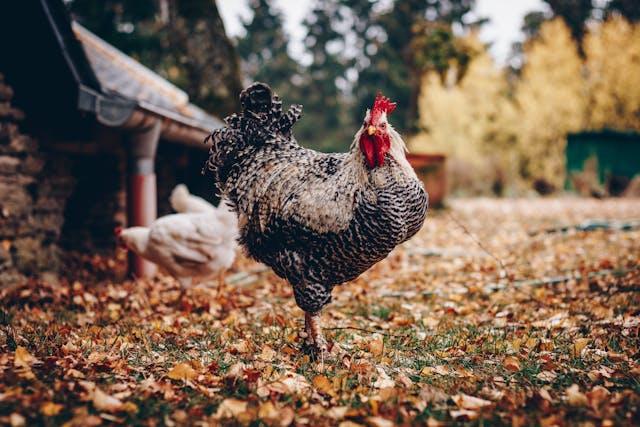Discover What Plants Benefit from Chicken Manure

Chicken manure is one of the most powerful organic fertilizers you can add to a garden. Packed with nitrogen, phosphorus, and potassium, it nourishes plants, improves soil health, and supports beneficial soil microbes.
Using chicken poop for fertilizer must be done right. Fresh manure can be too strong. However, properly composted poultry manure is a safe and balanced soil amendment.
This guide explains how much chicken manure to add to soil, the key benefits, how to prepare and apply it, and what plants benefit most from this nutrient-rich material.
What Is Chicken Manure and Why Use It?
Chicken manure fertilizer comes from poultry bedding and droppings collected in a chicken coop. Compared to other manures, it is especially nutrient rich, often containing twice the nitrogen of cow manure. These nutrients stimulate leafy growth, strengthen root systems, and increase overall yields.
Fresh chicken manure should not be applied directly to plants. Instead, it must go through an aging chicken manure or composting process. During composting, the process destroys weed seeds and harmful pathogens, while organic matter breaks down into a stable soil amendment.
When properly composted or aged, chicken manure:
- Improves soil structure by adding organic materials.
- Enhances water retention in sandy soils.
- Boosts drainage and aeration in heavy soils.
- Promotes a healthy balance of beneficial soil microbes.
Learn more about integrating poultry into gardening systems with 10 Tips for a Chicken-Friendly Garden and Raising Chickens.
How Much Chicken Manure to Add to Soil
The right amount depends on soil type, crop needs, and whether you are using aged manure or fresh. A general guideline is:
- 20–30 pounds of composted poultry manure per 100 square feet of garden soil.
- Mix it evenly into the top 6–8 inches of soil for best results.
For raised beds, 1–2 inches of well-composted manure worked into the soil surface before planting is usually sufficient.
Avoid over-application. Too much can overload soil with nitrogen and salts, damaging plants and soil health. Washington State University offers detailed recommendations on safe use in its manure guidelines.

Preparing Chicken Manure for the Garden
Fresh vs. Composted or Aged
- Fresh chicken manure is very high in nitrogen and may burn roots. It also carries harmful bacteria.
- Composted or aged manure has been broken down in a compost pile, making it safer and more effective.
Aging chicken manure for 6–12 months or composting it with bedding materials such as straw or wood shavings reduces odor, kills pathogens, and stabilizes nutrients. Explore more at Choosing the Best Poo for You.
Composting Chicken Manure
The composting process involves mixing manure with carbon-rich bedding, turning the pile regularly, and maintaining moisture. This introduces oxygen that speeds decomposition and supports beneficial organisms. Properly composted manure also eliminates most weed seeds.
Find bagged, ready-to-use composted poultry manure or try the Sup’r Green Chicken Manure for an easy option.

What Plants Benefit from Chicken Manure?
Understanding what plants benefit from chicken manure ensures you use it wisely.
- Leafy greens (lettuce, kale, spinach): Thrive on the nitrogen boost.
- Corn and brassicas (broccoli, cabbage, Brussels sprouts): Heavy feeders that respond well to poultry manure.
- Fruit trees: Benefit from applications in early spring—see When and How to Fertilize Your Fruit Trees.
- Tomatoes and peppers: Grow vigorously when chicken fertiliser is mixed into soil before planting.
Root crops such as carrots, radishes, and beets require lighter applications. Too much nitrogen encourages leafy tops instead of good root formation.
If you want pre-composted options, browse GrowOrganic’s chicken manure collection or general organic fertilizers.

Comparing Chicken Manure with Other Fertilizers
- Cow manure vs. chicken manure: Poultry manure contains higher nitrogen, phosphorus, and potassium, but must be composted first.
- Chicken manure vs. synthetic fertilizers: Poultry manure adds organic matter and supports microbes, while synthetics provide quick nutrients but no long-term soil benefits.
- Compost vs. chicken manure: Both enrich soil, but chicken poop for fertilizer generally offers more concentrated nutrients.
For vegetable gardeners, the combination of chicken manure with other vegetable fertilizers provides balanced nutrition.
Safety Tips for Handling Chicken Manure
- Always wear gloves when handling poultry manure.
- Avoid using fresh chicken manure near crops eaten raw.
- Wash vegetables thoroughly before consumption.
- Pregnant women, children, and immunocompromised individuals should avoid direct handling.
For poultry keepers, ensure coops are cleaned regularly—find designs at building chicken coops.
Conclusion
Chicken manure is one of the best organic fertilizers for gardeners. By knowing how much chicken manure to add to soil and what plants benefit from chicken manure, you can grow healthier, more productive plants.
With proper composting chicken manure and safe handling, gardeners turn waste from a chicken coop into a powerful, sustainable resource.
Shop Grow Organic’s chicken manure fertilizer, organic fertilizers, and fertilizer supplies to give your garden a natural boost.


1 comment
Great information